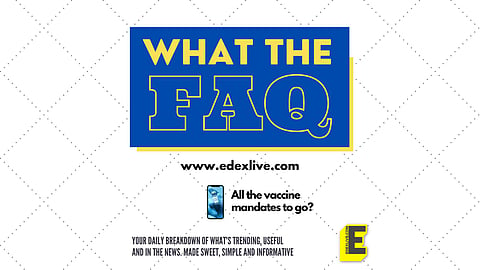

Amid a surge in COVID-19 infections across the county, the Supreme Court, in a landmark judgement, has stated that unvaccinated individuals cannot be forced to get vaccinated. It has also questioned the vaccine mandates rolled out for such individuals by different states and union territories. This may come as a welcome move for those who choose not to take the vaccine, but the court has also said that if such individuals risk the spread of the infection, then restrictions may be imposed on them.
Sounds a bit mixed-up and confusing? Don’t worry. Edex has got it covered. Read on to find answers to all your whats and hows.
What did the Supreme Court say exactly?
On Monday, May 2, the Supreme Court said that any individual cannot be forced to get vaccinated against COVID-19, but also added that, “as long as there is a risk of spreading the disease, there can be restrictions placed on individuals’ rights in larger public interest”.
A bench headed by Justices L Nageswara Rao and BR Gavai sought reviews on vaccine mandates imposed by various state and union territory governments. It stated, “We suggest that all authorities in this country, including private organisations and educational institutions, review the relevant orders and instructions imposing restrictions on unvaccinated individuals in terms of access to public places, services and resources, if not already recalled”.
What else did the court state?
The court, all the same, upheld the Centre’s vaccination policy, saying it was not “unreasonable or manifestly arbitrary”. However, it also asked the government to make data on adverse events after immunisation “publicly accessible”.
The court also made it clear that the government’s right to regulate by imposing limits to individual rights for the sake of protecting public health was also open to judicial scrutiny. It was to be ensured that the government’s interventions into the personal autonomy of an individual met the “three-fold” requirements (legality, legitimacy and proportionality) as mandated by the court.
Now, what are vaccine mandates?
A vaccine mandate requires a person to take the coronavirus vaccine in order to do certain things, such as working, travelling, or attending an event. It does not mean that a person will be made to take the vaccine, but a person who has not taken the vaccine can be legally stopped from places where it’s mandated.
So, are vaccine mandates effective or not? What does research say?
Vaccine mandates are effective in the sense that it often urges people to take the vaccine. US-based Johns Hopkins Center for Health Security cited the example of Tyson Foods, which announced a vaccine mandate for its approximately 1,20,000 workers in August 2021. By November, 60,500 previously unvaccinated employees had received the shot, bringing the company-wide vaccination rate to 96 per cent.
How many countries have vaccine mandates?
Many countries have imposed vaccine mandates. Ecuador became the first country in the world to make COVID-19 vaccinations mandatory in December 2021, including for children over five. Some places in India also imposed vaccine mandates, especially for international travellers.
However, as the COVID-19 infections were seen to be coming under control, many countries removed their imposed mandates. The US, Switzerland and Greece are just a few examples. Most of the European countries have dropped their travel restrictions which mandated travellers to carry proof of vaccination.
Coming back to India, how did SC's judgement come about?
The decision came after a petition was heard, filed by Dr Jacob Puliyel, a former member of the National Technical Advisory Group on Immunisation (NTAGI), seeking disclosure of vaccine trial data and stay on vaccine mandates. In the hearing, the court has backed its judgement considering bodily autonomy and bodily integrity, which are protected under Article 21.
The court also reviewed the evidence submitted, and said, “no data has been placed by the Union of India or the states appearing before us, controverting the material placed by the petitioner in the form of emerging scientific opinion which appears to indicate that the risk of transmission of the virus from unvaccinated individuals is almost on par with that from vaccinated persons”. So, the mandates imposed by governments against unvaccinated people were “not proportionate”, it reasoned.
So, that’s it, then?
No, not really. There’s a catch. The Supreme Court has also said that, "As long as COVID-19 numbers are low, no restriction should be placed on individuals from accessing public areas and the same should be recalled if such restrictions are in place". So, the court might make changes to its judgement if necessary in future.
